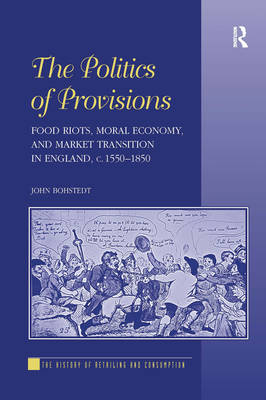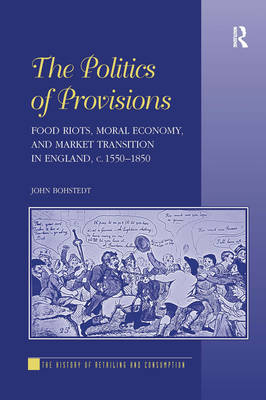
Je cadeautjes zeker op tijd in huis hebben voor de feestdagen? Kom langs in onze winkels en vind het perfecte geschenk!
- Afhalen na 1 uur in een winkel met voorraad
- Gratis thuislevering in België vanaf € 30
- Ruim aanbod met 7 miljoen producten
Je cadeautjes zeker op tijd in huis hebben voor de feestdagen? Kom langs in onze winkels en vind het perfecte geschenk!
- Afhalen na 1 uur in een winkel met voorraad
- Gratis thuislevering in België vanaf € 30
- Ruim aanbod met 7 miljoen producten
Zoeken
The Politics of Provisions
Food Riots, Moral Economy, and Market Transition in England, C. 1550-1850
John Bohstedt
€ 305,45
+ 610 punten
Uitvoering
Omschrijving
The elemental power of food politics has not been fully appraised. Food marketing and consumption were matters of politics as much as economics as England became a market society. In times of dearth, concatenations of food riots, repression, and relief created a maturing politics of provisions. Over three centuries, some eight hundred riots crackled in waves across England. Crowds seized wagons, attacked mills and granaries, and lowered prices in marketplaces or farmyards. Sometimes rioters parleyed with magistrates. More often both acted out a well-rehearsed political minuet that evolved from Tudor risings and state policies down to a complex culmination during the Napoleonic Wars. 'Provision politics' thus comprised both customary negotiations over scarcity and hunger, and 'negotiations' of the social vessel through the turbulence of dearth. Occasionally troops killed rioters, or judges condemned them to the gallows, but increasingly riots prompted wealthy citizens to procure relief supplies. In short, food riots worked: in a sense they were a first draft of the welfare state. This pioneering analysis connects a generation of social protest studies spawned by E.P. Thompson's essay on the 'moral economy' with new work on economic history and state formation. The dynamics of provision politics that emerged during England's social, economic and political transformations should furnish fruitful models for analyses of 'total war' and famine as well as broader transitions elsewhere in world history.
Specificaties
Betrokkenen
- Auteur(s):
- Uitgeverij:
Inhoud
- Aantal bladzijden:
- 324
- Taal:
- Engels
- Reeks:
Eigenschappen
- Productcode (EAN):
- 9780754665816
- Verschijningsdatum:
- 28/09/2010
- Uitvoering:
- Hardcover
- Formaat:
- Genaaid
- Afmetingen:
- 156 mm x 234 mm
- Gewicht:
- 630 g

Alleen bij Standaard Boekhandel
+ 610 punten op je klantenkaart van Standaard Boekhandel
Beoordelingen
We publiceren alleen reviews die voldoen aan de voorwaarden voor reviews. Bekijk onze voorwaarden voor reviews.









